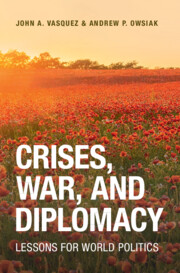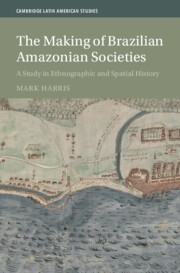Refine search
Actions for selected content:
616408 results in History

Crises, War, and Diplomacy
- Lessons for World Politics
-
- Published online:
- 07 November 2025
- Print publication:
- 20 November 2025

African Literature in Transition
- Intellectual Traditions of African Literature, 1960–2015
-
- Published online:
- 07 November 2025
- Print publication:
- 20 November 2025
Educational Expertise, Networks, and Policy-Making under State Socialism: School Maturity in Czechoslovakia and Poland (1950s-1970s)
-
- Journal:
- History of Education Quarterly , First View
- Published online by Cambridge University Press:
- 07 November 2025, pp. 1-29
-
- Article
-
- You have access
- Open access
- HTML
- Export citation
Financing Foreign Policy: UK Government–Bank Relations During the Development of the 1981–2 Sovereign Debt Crisis in Poland, Romania and Hungary
-
- Journal:
- Contemporary European History , First View
- Published online by Cambridge University Press:
- 07 November 2025, pp. 1-16
-
- Article
-
- You have access
- Open access
- HTML
- Export citation
Spoon-Shaped Objects with Weapon Terminals from Western Britain
-
- Journal:
- Britannia , First View
- Published online by Cambridge University Press:
- 07 November 2025, pp. 1-9
-
- Article
- Export citation
Social intervention in Curaçao: Using behavioral science technologies for social and economic development, 1969–1971
-
- Journal:
- Science in Context , First View
- Published online by Cambridge University Press:
- 07 November 2025, pp. 1-21
-
- Article
-
- You have access
- Open access
- HTML
- Export citation

The Making of Brazilian Amazonian Societies
- A Study in Ethnographic and Spatial History
- Coming soon
-
- Expected online publication date:
- November 2025
- Print publication:
- 20 November 2025
-
- Book
- Export citation
Assessing Defence in Late Antique North-eastern Gaul and the Germanic Provinces c. a.d. 250–500: Biases, Distribution and Chronology
-
- Journal:
- Britannia , First View
- Published online by Cambridge University Press:
- 07 November 2025, pp. 1-23
-
- Article
-
- You have access
- Open access
- HTML
- Export citation
“A Valuable Man” and “One of the Wisest and Best of Mankind”: Jeremy Bentham, Edward Gibbon Wakefield, and Systematic Colonization
-
- Journal:
- Modern Intellectual History , First View
- Published online by Cambridge University Press:
- 07 November 2025, pp. 1-23
-
- Article
-
- You have access
- Open access
- HTML
- Export citation
Intellectual Property in Developer-Funded Archaeology Projects in Britain from the Roman Period
-
- Journal:
- Britannia , First View
- Published online by Cambridge University Press:
- 07 November 2025, pp. 1-21
-
- Article
- Export citation

Making Medical Progress
- History of a Contested Idea
- Coming soon
-
- Expected online publication date:
- November 2025
- Print publication:
- 20 November 2025
-
- Book
- Export citation
Imperialization of street names as part of the cultural appropriation of urban space in late imperial Vilnius
-
- Journal:
- Urban History , First View
- Published online by Cambridge University Press:
- 07 November 2025, pp. 1-15
-
- Article
-
- You have access
- Open access
- HTML
- Export citation
Intramural Human Remains from Roman Towns in Britain: A Case Study from Late Iron Age and Roman Silchester
-
- Journal:
- Britannia , First View
- Published online by Cambridge University Press:
- 07 November 2025, pp. 1-26
-
- Article
-
- You have access
- Open access
- HTML
- Export citation
A Possible Roman Camp on the Wirral Peninsula
-
- Journal:
- Britannia , First View
- Published online by Cambridge University Press:
- 07 November 2025, pp. 1-7
-
- Article
- Export citation
Therapies crossing borders in European state socialism, 1950-1990. Introduction to the special issue
-
- Journal:
- Medical History , First View
- Published online by Cambridge University Press:
- 07 November 2025, pp. 1-9
-
- Article
-
- You have access
- Open access
- HTML
- Export citation
Approaching Connectivity and Community Through Rural Crafts in Early Roman Cambridgeshire: The Case of the Lower Ouse Valley Potteries
-
- Journal:
- Britannia , First View
- Published online by Cambridge University Press:
- 07 November 2025, pp. 1-35
-
- Article
- Export citation

In Defense of Economic and Social Human Rights
- An Intellectual History, 1940 to the Present
-
- Published online:
- 06 November 2025
- Print publication:
- 20 November 2025
1 - Introduction
-
- Book:
- Institutional Change and Property Rights before the Industrial Revolution
- Published online:
- 23 October 2025
- Print publication:
- 06 November 2025, pp 1-22
-
- Chapter
- Export citation
maps
-
- Book:
- The Rise and Fall of Turkey's Democrat Party
- Published online:
- 23 October 2025
- Print publication:
- 06 November 2025, pp xv-xvi
-
- Chapter
- Export citation
1 - “In the Shadow of the Vatican”
-
- Book:
- In the Shadow of the Vatican
- Published online:
- 23 October 2025
- Print publication:
- 06 November 2025, pp 14-59
-
- Chapter
- Export citation
